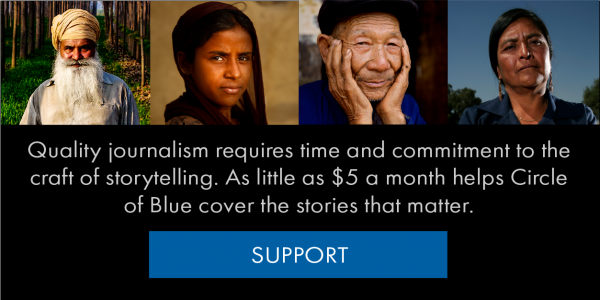The Stream, August 16: Water Use in U.S. Fracking Has Risen by 770 Percent Since 2011, Study Finds
The Global Rundown
A new study shows that water used for fracking in the United States has risen by 770 percent since 2011. An acute water shortage is expected in Kerala, India, as the “worst flood in a century” submerges water treatment plants. Volunteers in drought-stricken Colorado continue to deliver water to wild horses. Germany announces that it will ease certain environmental laws in order to provide more animal fodder. Researchers investigate an unexpected algae bloom in Lake Superior. Water cuts in Caracas, Venezuela, force hospitals to postpone or cancel surgeries.
“I have gone to the operation bloc and opened the tap to wash my hands, as you must do before a surgery, and nothing comes out.” –Lina Figueria, a gynecologist at the Central Venezuelan University hospital, in reference to water shortages in Caracas, Venezuela. Corruption and deteriorating infrastructure have left a majority of Caracas residents without water in recent months. In hospitals, bathrooms are closed, taps are dry, and the water shortages are disrupting surgery schedules. Reuters
In context: HotSpots H2O, July 23: Chaos Engulfs Venezuela as Mismanagement and Drought Cut Water Access.
Latest WaterNews from Circle of Blue
What’s Up With Water – August 13, 2018 – “What’s Up With Water” condenses the need-to-know news on the world’s water into a weekly snapshot. Coverage this week includes: severe drought in Australia, extreme heat in Europe, and Israel’s changing water strategy.
HotSpots H2O, August 13: Intercommunal Violence Escalates in Ethiopia, Displacing One Million People – Since April, intercommunal violence has flared in Ethiopia’s Gedeo and West Guji zones, displacing an estimated one million people. The cause of the violence is unclear, but long-time regional tensions over land and water may be partially to blame.
By The Numbers
3,400 gallons Amount of water that volunteers have been hauling to wild horses in Colorado each day as drought impacts the horses’ food and water supply. According to the Bureau of Land Management, between 650 and 750 horses live in Colorado’s Sand Wash Basin. U.S. News & World Report
50 miles Length of an unexpected algae bloom in Lake Superior last week. Although it has mostly dissipated, researchers are still investigating the makeup and causes of the bloom. By the end of this week, test results should reveal whether the bloom was toxic. The New York Times
In context: Circle of Blue’s reporting on Great Lakes algae.
Science, Studies, And Reports
A study by Duke University found that the amount of water used for fracking throughout the United States rose by 770 percent between 2011 and 2016. Researchers also noted that the amount of wastewater produced by new wells in their first year of operation has soared by up to 1,440 percent. The study estimates that fracking’s water footprint could increase by 50-fold over the next decade if water use continues to escalate. Science Daily
On The Radar
Germany confirmed that it will relax certain environmental conservation rules in order to aid drought-stricken farmers. According to the government, some of the country’s protected meadowlands will be cultivated for animal feed. An announcement on whether the country will provide additional aid to farmers is expected next week. Reuters
Spotlight: India
Follow The Stream for daily coverage on India’s water crisis.
Flooding is Kerala, India, is now being called the worst deluge of the century and has left 67 people dead. The floods are threatening to disrupt water supplies in the region as torrential monsoon rains damage or submerge most of Kerala’s water treatment plants. The Economic Times

Kayla Ritter is a recent graduate of Michigan State University, where she studied International Relations and Teaching English to Speakers of Other Languages. She is currently based in Manton, Michigan. Kayla enjoys running, writing, and traveling. Contact Kayla Ritter





Leave a Reply
Want to join the discussion?Feel free to contribute!